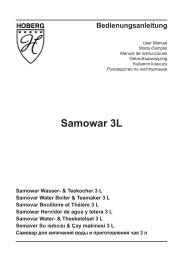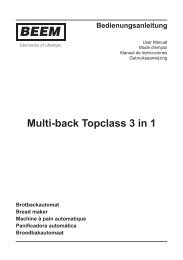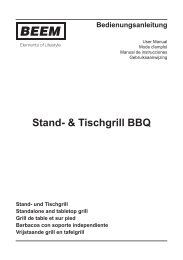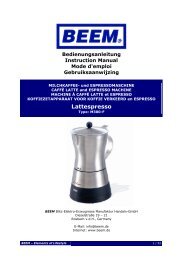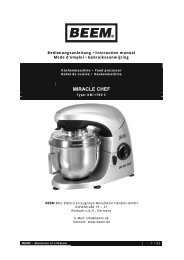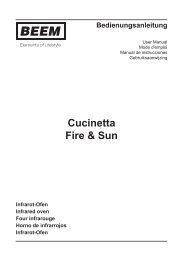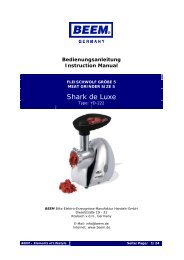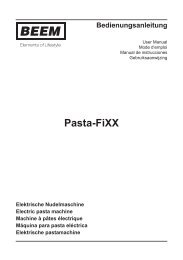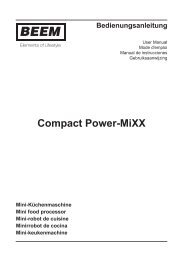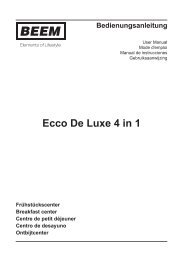You also want an ePaper? Increase the reach of your titles
YUMPU automatically turns print PDFs into web optimized ePapers that Google loves.
<strong>Baby</strong> <strong>Vital</strong>-<strong>Center</strong> EN<br />
26<br />
Tips/Recipes<br />
Spoon feeding with supplementary food<br />
starts between the 4th and 6th months.<br />
Self-made tasty food is prepared quickly<br />
and free from harmful substances if the<br />
ingredients originate from ecological cultivation.<br />
In addition, the appliance steams<br />
the food and preserves vitamins at the<br />
same time – healthy food right from the<br />
very beginning.<br />
Tips<br />
■ Begin with a few spoonfuls of mashed<br />
carrots between between meals and<br />
increase the amount from day to day.<br />
When 100 g has been reached, you<br />
can replace the milk feed with porridge<br />
– preferably beginning with the midday<br />
meal.<br />
■ Babies like sweet foods which they<br />
are use to from breast milk. Begin supplementary<br />
feeding with carrots, they<br />
taste sweet and are also very easily<br />
digested. Marrow, parsnips or turnip<br />
cabbage are also suitable – however,<br />
only one vegetable type per meal and<br />
a maximum of 2 new vegetable types<br />
per week.<br />
■ In order to also make other vegetables<br />
tasty for your child try out a previously<br />
accepted type first.<br />
■ Potatoes or meat should be added to<br />
vegetables beginning at roughly the<br />
6th to 7th month. However: your child<br />
must get used to the new food first.<br />
Give the baby one new ingredient per<br />
week. Example: mashed carrots in the<br />
first week, add mashed potatoes in the<br />
2nd week, add meat in the 3rd week<br />
and then sunflower oil in the 4th week.<br />
■ A complete supplementary diet consists<br />
of around 100 g vegetables, 50<br />
g carrots, 10 g fat and roughly 20 g of<br />
meat 2 to 3 times a week – altogether<br />
150 to 180 g of baby food.<br />
■ Parallel to supplementary feeding, you<br />
should also give the baby drinks. Make<br />
sure that they do not contain sugar.<br />
■ <strong>Baby</strong> food does not need spices or<br />
flavour enhancers. Babies have a very<br />
fine sense of taste and do not require<br />
additional stimulation, the taste of the<br />
different vegetable types is sufficient.<br />
This also reduces the risk of allergic<br />
reactions.<br />
■ Raw vegetables, cabbage and peas<br />
and beans are difficult to digest for babies.<br />
Be careful with tomatoes as they<br />
can cause nappy rash.<br />
■ After the midday meal, the other milk<br />
feedings are gradually replaced: at first<br />
at midday (e.g., by a fruit-grain puree),<br />
then in the evening (e.g., milk-grain<br />
puree) and finally in the morning.<br />
BEEM - Elements of Lifestyle



